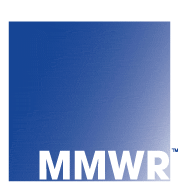Title: MMWR Vol. 59 / Early Release
| If you have trouble reading this e-mail, please click here.
|

|

|
Early Release
Volume 59, Early Release
June 2, 2010
|

|
|
|
|
| Preliminary Results: Surveillance for Guillain-Barré Syndrome After Receipt of Influenza A (H1N1) 2009 Monovalent Vaccine — United States, 2009–2010
|

|
|
|

|
| Guillain-Barré syndrome (GBS) is an uncommon peripheral neuropathy causing paralysis and in severe cases respiratory failure and death. In rare cases, GBS can follow vaccination. To monitor influenza A (H1N1) 2009 monovalent vaccine safety, various federal surveillance systems, including CDC’s Emerging Infections Program (EIP), are being used. Preliminary results from an
analysis in EIP comparing GBS patients who did and did not receive 2009 H1N1 vaccination revealed data, which if confirmed by end-of-surveillance analysis, would correspond to 0.8 excess cases of GBS per 1 million vaccinations, a rate similar to that found with seasonal influenza vaccines.
|
 full text full text
|

|
|
|
Department of Health and Human Services
Centers for Disease Control and Prevention
|
|
|
Modify/Update Subscriber Preferences | Unsubscribe | Send Feedback | Learn more about CDC Email Updates
To receive the latest news for your region, please update your profile with your country, state and zip code.
Questions or problems? Please contact support@xxxxxxxxxxxxxxx.
Centers for Disease Control and Prevention (CDC) · 1600 Clifton Rd · Atlanta GA 30333 · 800-CDC-INFO (800-232-4636)






